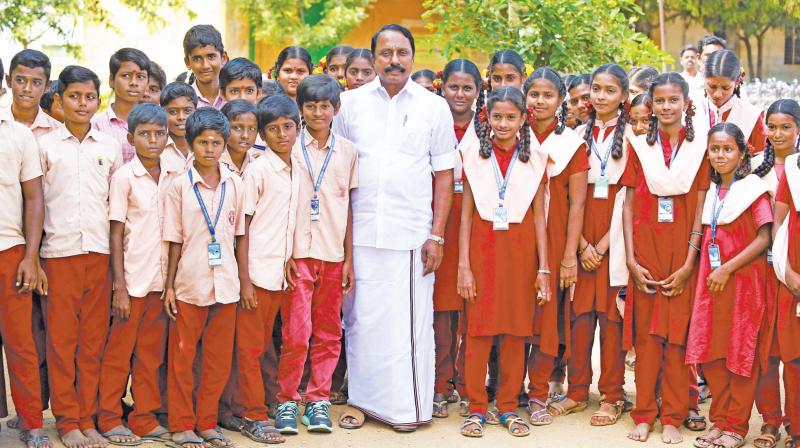Set for takeoff
Many of the changes are being introduced in the next academic year to make better students and human beings out of TN youth.

Chennai: Where is Tamil Nadu education heading after the Neet battle was lost and students from here have to compete nationally? What is the solution to the more generic problems of knowledge of English in which TN students have been seen to be weaker when they are in the elite company in national competition?
The great amount of negativity over the loss of the Neet exemption is over and regardless of poorish results, TN boys and girls have reconciled to the fact that they have to compete to become medical students. What about the standards of education now and the eternal complaints about the dip in quality?
Well, there is at least one important person who is aware of the problems and is digging in to do his best to help change the system. He is none other than the State’s School Education Minister, K. Sengottaiyan. He has a vision for positive and progressive changes in the education system. He’s not scared of the challenge of taking the youngsters of the State into the modern era of scientific advancement.
“As Education Minister I put the younger generation first. I would be failing in my vision if I could not think for them, think like them and make them think of their future,” the minister says as he begins a long conversation on what can be done to bring about the change everyone is thirsting for.
A modern vision for education in the thousands of government schools in the State includes revised syllabuses, greater audio-visual focus in teaching the very young, the tapping of technology in giving students the teacher’s lectures downloaded from YouTube to revise at home, colourful uniforms at every stage from LKG to Plus-2 so that they do not get any inferiority complex vis a vis private schools, awareness lessons on a lot of subjects – on road safety too – and yoga for health.
Many of the changes are being introduced in the next academic year to make better students and human beings out of TN youth. “Teacher training in the new methods and syllabuses is important. We plan to do it from January so that we are ready when the schools open for term in June-July. There should be no dropouts from LKG and UKG nor should parents take them away to private schools. They can cope with private school fees if they have one kid, but the moment they have to take care of two children, they begin falling into debt. We don’t want that to happen,” Mr Sengottaiyan explains.
The Montessori-based teaching in LKG-UKG will be geared towards fun-filled, audiovisual learning. There will be songs to hear, rhymes to tell, stories narrated to keep the kids engrossed. The planning is not restricted to the entry level. A sea change is being brought about at all levels by placing the emphasis on subject and career guidance for students, a matter in which the parents will also be involved.
The government is bringing out colourful ready reckoners that will list about 286 different fields of study to make a career that should be far more inclusive than just engineering and medicine.
At a glance, information is available on what courses are offered best in which colleges around the country. Ten major subjects and career streams – engineering, medical, agriculture, animal husbandry, etc. - to help prepare the student for life and career have been identified. Significantly, the emphasis is going to be on mathematics and English and not a trace of language chauvinism here.
“If they learn mathematics well, it will help develop their IQ. Even our students who pass engineering and medicine hesitate to speak in English. How we are planning to tackle this is by focusing on kids in standards 6 to 8. They will be given tablets (costing about '3,000) in which 3,000 common words and phrases in English, French, Tamil, etc. would be downloaded. We are hoping students will make good use of this to gain fluency in speech,” Mr Sengottaiyan says with great enthusiasm.
For the first time in the country, there is a helpline – 14417 – manned effectively for students, parents and teachers to call and clear any doubts about course, books, career guidance and so on. There will be notice boards in schools guiding students to streams of study and careers. And, remarkably, the government has also brought out graphics to illustrate to young students what is a good touch and a bad touch. When it was pointed out that this is “very necessary these days,” the minister smiled, knowing the government was keeping pace with a changing world.
The minister also went on to explain why the State has banned ranks in schools. “Sometimes students get so upset by losing top ranks by just one mark that they even begin to feel suicidal. The marks can be put out but there should be no ranking, no publicity for this school got so many ranks, etc.,” he said pointing to how sympathy is guiding some of the major decisions to do with school education. The government is also banning the dupatta that might endanger girl pupils when they cycle.
And yet the minister promises there will be no abrupt changes that may find resistance. “Old and new VCs are involved in policy making and we are prepared to listen to all people and parties before deciding,” Mr Sengottaiyan says. For instance, when they wanted to close 1,342 village schools that had no students there was political resistance. And so they decided the schools would not close although it costs about '16 lakhs a year per school to keep them operational.
The schools will continue to have at least one teacher while it becomes a place to study and to read books for the village children.
“But if we merge schools and send pupils 2-3 kms away to bigger schools with more teachers, the students will benefit. They will learn more subjects from teachers who are more familiar with different subjects,” he explains.
Sport will be compulsory from next academic year, so too yoga classes once a week. But schools will offer all kinds of traditional and international sports depending on how much of a playground there is. Chess, carrom, gymnastics and many more sports and pastimes are being brought into the fold. Shaping all this would be at least three parent-teacher-pupils meetings at which the parents will also be disseminated information on studies and career options.
What concerns the minister, who comes from a rural background, is how much the cellphone has taken over everyone’s lives. “Previously, children would go home and even with domestic work before getting down to read their school books by the hurricane lamps. Today they have time only for WhatsApp and Facebook,” he says with great concern. “But we can’t ban cellphones. We might as well make use of them for downloading their studies and teaching them to use this as a tool rather than just time pass,” he says with a touch of revealing realism.
Among major plans for Plus-1 and 2 students is also skills training so students who need to can think of jobs straightaway. As many as 3,000 smart classes are on the anvil for students in classes 6 to 8, which is going to be the focus as members of the new generation who can be made ready for the world of the present and future. SMS results with close to 100 per cent accuracy has already eased the minds of students when it comes to knowing their exam performances.
With QR codes, students can simply download lessons without needing to carry a ton of textbooks to class.
All this may seem very futuristic for government schools, but this where it is all headed thanks to the work of diligent bureaucrats and the vision of the minister in understanding the concepts and encouraging them to think big and give education in Tamil Nadu the leap it needs to catch up and lead once again.

